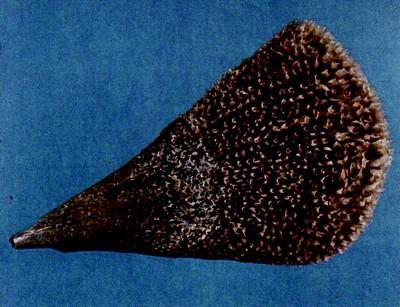Protected bivalves of the Istrian seabed
Periska - The Noble Pen Shell
 The noble pen shell (Pinna nobilis) is a species of large clams in the family Pinnidae (pen shells). It was first described by the Swedish botanist and doctor, Carl Linné (1707 – 1778), known for introducing the system of binominal nomenclature by which every plant and animal is identified by a name using two Latin words signifying genus and species.
The noble pen shell (Pinna nobilis) is a species of large clams in the family Pinnidae (pen shells). It was first described by the Swedish botanist and doctor, Carl Linné (1707 – 1778), known for introducing the system of binominal nomenclature by which every plant and animal is identified by a name using two Latin words signifying genus and species.
The noble pen shell is not only the largest clam in the Adriatic but also one of the largest in the world. It can grow up to 1 m in size although it averages from 30 to 60 cm. While its average weight is around 0.40 kg, it can weigh up to 3 kg. The surface colour of the shell is light brown while the inside is opal, lined with mother-of-pearl. The noble pen shell has a pointed triangular shape; its outer surface is decorated with scaly slices that are more prominent in juvenile, younger specimens. The shells are thin and very fragile.
The noble pen shell is endemic to the Mediterranean Sea and is very wide-spread throughout the Adriatic region where it lives offshore in sandy and muddy sea beds overgrown with tall and short sea-grass fields. It positions itself vertically in soft seabeds at a depth of 2 to 20 m, attaching itself to the sea floor using silk-like threads called byssus. Sometimes it can produce small irregular shaped pearls. Tiny crabs often make their homes in the clam. The noble pen shell feeds on floating organic particles; it is a hermaphrodite and spawns in late spring and summer.
This attractive clam is very rare so it is strictly protected by the Nature Protection Act. It is prohibited to extract it or have it in your possession.
According to the Ordinance on the Proclamation of Protected and Strictly Protected Wild Taxa, the noble pen shell falls under the category of strictly protected native taxa.
Other folk names include:
Plemenita periska, lostura, lustura, loštura, lastura, lostira, loštira, lošćura, ostura, jastura, rastura, rošćura, glostura, glastura, zlostura, stura, štora, škalatura, palastura, palostura, pajustura, paljustura and vela datula.
Foreign names:
Italian: Astura, Pinna
German: Steekmuschel
French: Jambonneau hérissé
Spanish: Nácar
Greek: Pinna







